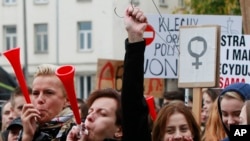Polish women donned black, waved black flags and took to Poland's streets on Monday, boycotting their jobs and classes as part of a nationwide strike waged to protest a legislative proposal for a total ban on abortion.
Many men also joined women on the streets of Warsaw, Gdansk and elsewhere across the largely Catholic nation on what has been dubbed "Black Monday.'' The country already has one of Europe's most restrictive abortion laws and opinion surveys show very little support for an even stricter law, despite the nation's deep Catholicism.
The strike and street demonstrations follow a street protest by thousands on Saturday in front of the parliament in Warsaw. Women were wearing black in a sign of mourning for the feared loss of reproductive rights and for the deaths that they feel some women will face if the proposal passes as it stands now.
Under the existing law, in force since 1993, abortion is banned except in cases where the woman's life is in danger, the fetus is irreparably damaged or the pregnancy results from rape or incest. The new proposal, now being examined by a parliamentary commission, would make all abortions illegal, even in cases of rape or when the woman's life is at risk, with prison terms of up to five years for women seeking abortion and doctors who perform them.
The proposal for the stricter law came from a pro-life citizens' initiative that had gathered 450,000 signatures, and is supported by the church. The conservative ruling party, Law and Justice, which has a majority in parliament, includes supporters of the proposal but it's not clear if there are enough to push it through.
Foreign Minister Witold Waszczykowski criticized the way protesters were expressing their views, saying: ``We expect serious debate on questions of life, death and birth. We do not expect happenings, dressing in costumes and creating artificial problems.''
While it was difficult to gauge participation in small towns and rural area, which tend to be conservative, participation in the cities appeared to be significant on Monday morning.
A large crowd gathered in central Warsaw and people were also out on the streets in other cities. People held up signs, including "My body, My choice,'' as well as coat hangers — a symbol of dangerous illegal abortions protesters fear could become more common.
The private all-news broadcaster, TVN24, with some of its own newscasters in black, broadcast images of establishments joining the strike: a restaurant in Wroclaw that closed to let female employees participate, a museum in Krakow where none of the women showed up to work.
In Czestochowa, a symbol of the country's Catholicism due to a major shrine there, more than 60 percent of employees refused to show up to work, according to TVN24. A televised report from city offices showed some women — those responsible for providing essential services — came to work wearing black.
The day of action also included a call for housewives to refuse to do housework.
The organizers of Monday's strike took their inspiration from a strike by women in Iceland in 1975 when 90 percent of women refused to work, clean or look after children, to voice anger at discrimination in the workplace. The strike was seen as success, raising awareness of women's plight and leading to a law the next year that guaranteed equal rights for men and women.




